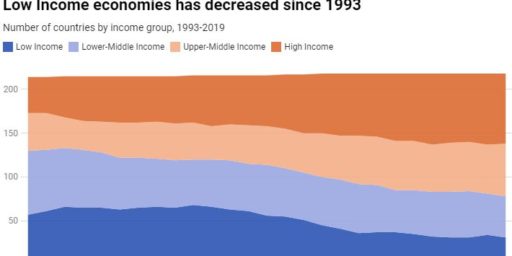Who Pays the Most Taxes?
Paul Caron cites a Tax Foundation study that finds “the top 1% of tax returns paid about the same amount of federal individual income taxes as the bottom 95% of tax returns.” Glenn Reynolds, reasonably enough, thinks “that degree of progressivity is actually bad.”
Kevin Drum, though weary from constantly having to point this out, notes that these calculations only include federal income tax and that, when one considers Social Security (aka “payroll”) taxes, things suddenly flatten out. Indeed, the tax burden becomes curvilinear, with “the 5,000 richest people in the country” paying less than those making $100,000. Further, if one includes excise taxes, state income taxes, sales taxes, or property taxes, the system is flatter yet, with those in the top and bottom quintile actually paying a slightly higher share of their incomes than those in the middle.
It’s reasonable enough to look at the overall tax burden. Still, doing so conflates a lot of issues and makes the debate harder to untangle.
First, it’s simply undeniable that the federal income tax is incredibly skewed. It’s not what it was before the Kennedy and Reagan tax cuts, by any stretch, but it’s hard to argue that those who earn 21.2% of the nation’s income should pay 39.4% of all federal income taxes when taken in isolation.
Second, while FICA is undeniably a tax, it’s of a different sort than income taxes. Social Security is, in theory anyway, a pension system rather than a means of collecting general revenue. The reason the very rich pay a smaller percentage of their income into Social Security is that the payout is capped and therefore so is the collection threshold.
Workers currently pay Social Security taxes on the first $90,000 of their wages. Some people have suggested that the cap be raised or even eliminated altogether. The result would be the largest tax increase in U.S. history, $541 billion in new taxes over the first five years alone. That tax increase would fall primarily, not on the superrich, but on many upper-middle-class families and small businesses. Many experts believe that such an enormous tax increase would hurt the U.S. economy and cost millions of jobs. Even worse, it would do relatively little to fix Social Security. Studies show that removing the tax cap altogether would extend the solvency of Social Security by only seven years.
Virtually everyone in the top 1% would gladly opt out of Social Security altogether. They stand to get a payout that amounts to a rounding error and they’re losing money that they would almost surely invest more fruitfully were they allowed to do so. The idea that they should nonetheless be taxed down to the last dollar of their earnings is just bizarre.
State and local taxes, meanwhile, are part of a different debate. Indeed, they’re thousands of different debates, with rates set by localities. The only taxation we can usefully debate as a society are those to which we collectively pay.
Further, they’re generally consumption based. They’re flatter than income-based taxes because spending patterns tend to be flatter. A rich person will likely buy a more expensive house and car than a poor one, and be taxed accordingly, but they’re probably using relatively similar amounts of gasoline, electricity, water, eggs, and milk. Surely, we shouldn’t charge rich people higher taxes at the grocery store simply because they can afford to pay more?






These are great arguments, especially on the Soc Sec ponzi scheme, but you forget that Drumm and his ilk don’t care about taxes being “fair”, it’s about punishing people who make more than they think they should.
especially on the Soc Sec ponzi scheme,
But capitalism is nothing more then a ponzi scheme, so what. Any system that depends on consistent growth is, by definition a “ponzi” scheme.
While this “may be great arguments”, it’s unfair to consider each individual tax in a vacuum.
E.g., capital gains taxes, I’d imagine that the top 5% pays almost all of the total cap gains taxes. So, is the CG tax unfair b/c it comes almost exclusively from the top x%?
To say we should only look at taxes we collectively pay is to ignore that we all have an obligation to help support our society. Those sales taxes you argue that we should ignore for overall fairness purposes, arguably have a more immediate impact on your average person’s life (police, fire, schools) than the income taxes paid to the federal government. And poor people pay a disproportionate share of their income in those taxes.
It may be impossible to argue each of those as a whole, but they are a very important part of how we pay for our society, but thus shouldn’t be ignored when looking at the overall tax picture.
Uhhmmm, no.
No, the social security argument by James is partisan apologism – it’s nothing more than a generation-based wealth transfer at this point. Yes, the payout has a ceiling and a floor per-year, but people currently receiving it on average blasted past their contributions, plus interest, very quickly compared to a real (private-sector) pension would have allowed them to do.
It’s very dishonest NOT to treat the payroll tax as just another form of income tax. Certainly we know that today’s workers aren’t going to be able to get the deal that today’s retirees got (or the deal that the system claims today’s workers will get, for that matter).
can’t remember who said it but, “Those who benefit the most, should pay the most.” (or something like that)
Food for thought (the devil is in the details)
“Uhhmmm, no.”
Steve,
Sure and you could have used the same link to refute the first comment about SS which was as absurd as my statement capitalism if you want to consider the idea of a ponzi scheme narrowly.
Considered broadly, any financial arrangement that requires infinite growth to avoid collapse could be look at as a ponzi scheme and that describes capitalism perfectly. Right now we think that our current brand of all hogs to the trough capitalism is sustainable but it ain’t. Anyone who thinks so is a bit more then dim.
Why? If you believe in a progressive tax system, as your earlier comments would suggest, this is not at all an unlikely outcome.
From the outset SS was a program designed to deal with the problem of poverty among the elderly. To the extent that pensions are intended to address the same problem they are the same, beyond that the similarities rapidly disappear.
Only if you think of SS in terms of a personal pension system, rather than what it actually is.
Because creating a majority that doesnt pay for anything and absorbs all the benefits is a dangerous thing to do in a democracy. Its something akin to reverse feudalism- but even more insipid because the logical conclusion is a massive disincentive to create any wealth. IE, the problem that has turned every experiment in Marxism into a horrific disaster.
James, the payout isn’t capped for anyone. It’s the rate of payout that’s capped. That’s part of the problem with the Social Security system.
The other thing that needs to be considered is that over the period of the last 30 years most income growth has been in the highest quintile—the quintile that has the most income exempt from FICA. That means that most of the real increase in national income is exempt from FICA.
To achieve fiscal sanity we’re going to have to subject a higher proportion of income to FICA (which means taxing those much of whose income is currently exempt), reduce payouts from the standpoint of rates, raise the retirement age, or borrow more. My preference is a combination of all of the above.
I agree with Dave, however all of that requires a political reality check about the nature of SS. Its been sold as an individual retirement account. Thats a crock, and for anyone that believed that, im sorry but all of us going down with the ship isnt going to make you feel any better. SS needs to be means tested, and in order to do that politicians need to admit that its an anti-poverty program for the elderly. I dont think the courage exists to touch that truth with a ten foot pole.
To achieve fiscal sanity we’re going to have to subject a higher proportion of income to FICA (which means taxing those much of whose income is currently exempt), reduce payouts from the standpoint of rates, raise the retirement age, or borrow more. My preference is a combination of all of the above.
Or just let us 40-year-olds invest our money ourselves. I’d opt out in a heart beat if allowed.
A rich person will likely buy a more expensive house and car than a poor one, and be taxed accordingly, but they’re probably using relatively similar amounts of gasoline, electricity, water, eggs, and milk. Surely, we shouldn’t charge rich people higher taxes at the grocery store simply because they can afford to pay more?
Even a consumption tax can be made progressive. States with sales taxes often do not tax necessities, like groceries or clothing. Water and electricity? Make the first X gallons tax-free; make the first Y kilowatt hours tax-free. As for other consumer goods, distinguish between luxury goods and ordinary goods. Exempt the first $10,000 spent on an automobile from the tax.
As for the regressiveness of the cap on FICA, I really don’t have much to say. It’s important to remember that the wealthy are going to get re-taxed on their Social Security benefits at a higher rate than the less wealthy, thus reducing their real benefit.
Addressing two quotes in this post. First:
Excuse me? I have no obligation to society. I have commited no crime. If I choose to associate with others, I do so voluntarily, on terms agreeable to all of us, and I do not agree I owe something to anyone just because I live and work here. Sorry if that erodes your idea of “society”, but if your idea of society includes me havng to pay debts you ran up, keep it.
And who benefits the most? Those who pay for private schools for their children, don’t commute on public roads nearly as often on a miles-per-person basis, those who hire personal security companies because the police are not legally obligated to prevent crimes? In essence, those who pay a second time to actually get the services they paid for but didn’t receive the first time?
Or is it those who get housing, food, healthcare, and even direct cash payments in the form of a “refundable” tax credit handed to them out of my pocket? Yes, let those who benefit most pay the most. But let’s be honest about who’s benefiting.
Mark Buehner, I don’t object to means testing, indeed, I should have included it in my list.
Unfortunately, I suspect that progressives will man the barricades to prevent it (same with Medicare) at least partially on the grounds that it would erode political support for it.
Again: no. A Ponzi scheme is not anything “broadly”. It is a very specific thing:
1. Person X induces investor A to invest. (Variant: Person X creates a fictitious investor A.)
2. Person X induces investors B, B1, B2, … to invest.
3. Person X uses the “B” investment funds to create a persuasive yet fictitious “return on investment” for investor A.
4. Person X uses the “return on investment” for investor A as “proof” of the investment quality, and thus induces investors C, C1, C2, … to invest even more.
5. Steps 3 and 4 repeat through additional investment rounds (D, E, etc.), growing the actual investment and the fictitious “return on investment” for “early investors”. There is little or no actual return on investment; but later investors are fooled to expect large returns.
This is not capitalism. At most, it’s a perversion of capitalism.
Many State and local taxes are really Federal taxes, collected locally. Also many local taxes are State taxes collected locally.
The Federal and State governments demand and require by force of law that certain things be done. But, in basic, fair and fundamentally anti-constitutional way, they do not themselves raise the taxes required, they king like command others to obey. Accordingly, I do not see any limit. I could see by this behavior Federal taxes dropping to zero as the Federal government can just command smaller, elected political entities to do the Federal governments wishes, and deliver the costs to the local citizens.
I suspect that Federal tax costs are way higher than is known or admitted to.
Like any crooked enterprise, auditing the books might well be a fruitless enterprise.
There’s a reason why people think that point-of-sale taes are a bad idea. They’re inherently regressive and screw over people at the lower end. Despite being somewhere to the right of Atilla The Hun, I view intentionally screwing over people at the low end exceptionally negatively.
Income taxes also have bad macro effects especially with how they are currently designed and applied. The “national sales tax” that is advocated is not a point of sale tax, but a flat rate income tax with a high deductible that has you write off all investments. It avoids the negative macro effects of both income and point of sale taxes.
FICA should be abolished, with currently promised SS benefits paid out of general revenues. Everyone short of 50 knows that they are going to get screwed and that they need to invest for themselves. Any scheme that pays off for a large majority of those who are promised benefits is going to fail.
Capitalism doesn’t require growth. It’s just the most efficient way of allocating resources and encouraging growth.
Who decided THIS and why wasn’t I asked first????
Or I could have used it to support the claim. In a Ponzi scheme one or more individuals act as the “hub” in a network of “investors”. Later investors investments are used to payback early “investors”.
The SSA acts as the hub in a network of “investors” (tax payers). Later “investors” (tax payers) investments (taxes) are used to payback early “investors” (tax payers), all with a positive rate of return.
Of course, SS has the benefit of government coercion (you don’t pay, then we do bad things to you), and thus everybody is forced to join the system. These facts and the fact that you can have multiple generations means that it would be harder for SS to collapse like a non-government backed Ponzi scheme…well unless there is a very large demographic shift.
Why is infinite growth necessary for a capitalist system. Dynamic systems can reach a steady state. The biggest reason why you see growth in many economies is population growth and improvements to productivity. Still if population growth and productivity ceased growing I don’t see why capitalism would have to collapse.
You are undermining your own argument here.
Also, another big difference between a Ponzi scheme and real economic activity is that the latter actually produces things like goods and services. A Ponzi scheme merely transfers cash around and produces nothing.
A Ponzi system and capitalism are two very different things. Capitalism requires sufficient growth to generate the returns to pay off the investor. A Ponzi scheme does not require growth to pay off the investor because the Ponzi scheme by definition does not pay off the investor.
From day one social security has always been a transfer program from one generation to another.
None of the defenders of social security have ever claimed otherwise.
Only opponents of social security try to make other claims as part of their opposition to social security.
Social security is not a pension plan — it is a supplement to pension plans.
There’s no inherent need for capitalism to collapse in a closed system.
Our current system might well be rocked and reformed by making it a ‘closed system’, but collapse is overstating the case – while simultaneously ignoring that it isn’t anything inherent in capitalism that caused the issues.
Surely, we shouldn’t charge rich people higher taxes at the grocery store simply because they can afford to pay more?
You’re ok with charging rich people more in the workplace. Why is the grocery store different?
The basis of capitalism, through out humanity, is the trader principle: an exchange of value, for value, by mutual consent, to mutual benefit.
Government corrupts the equation. But then what doesn’t government corrupt?
Congressional Budget office data for 2004 (most recent year available) http://www.cbo.gov/ftpdocs/77xx/doc7718/EffectiveTaxRates.pdf
Tax rates: all federal tax payments as a percent of income (with income defined to include all cash income and inkind payments):
poorest 20% 4.5% tax rate
second poorest 20 10% tax rate
Third poorest 20 13.9% tax rate
fourth poorest 20 17.2% tax rate
richest 20% 25.1% tax rate
richest 10% 26.0% tax rate
richest 5% 28.5% tax rate
richest 1% 31.1% tax rate
Bob Bonsall and Kirsten: If you don’t want to participate in the benefits of society, you’re free to move to a tiny island somewhere. To say that you don’t receive the benefits of society? Without the government and courts to enforce property rights, you wouldn’t have a house, or a stock portfolio, etc.
Social Security is a combination of social insurance and pension. Your first tax dollars fund more benefits, according to the formula, than later tax dollars.
Social Security also has features of a tontine, especially if you are not married and have no dependents.
And finally, Social Security lacks even the meager protection of the PBGC. An act of Congress could end Social Security tomorrow.
David writes, in what I’m sure he believes is a devastating riposte:
Apples and oranges. Only a few anarchist cranks are complaining about the level of taxation necessary to fund basic government functions. Rather, the gripe is with the increasingly common but no less morally and intellectually bankrupt attitude that it’s justifiable to tax people at confiscatory rates, in order to pay the debts of perfect strangers, merely because we all live and work here.
My understanding and the understanding of everyone I have seen writing on this from all over the political spectrum is that we pay 12.4% of income to SS on the first 90K earned. Is their a difference in this payment for someone with a taxable income of 90K and someone with a taxable income of 100K? 250K? 1000K? If not it seems that there is an effective cap on payout. If so could you link to a source that show these differences?
BC says
in defense of
and
very nice
This begs a few questions,
What is a confiscatory rate?
Given the definition of confiscatory aren’t all mandatory taxes confiscatory?
At what rate do taxes become intellectually and morally bankrupt?
What makes a tax morally bankrupt? intellectually bankrupt?
Do you simply live and work in the US or are you a participating member of our society?
Grewgills,
He is referring to lifetime payout being essentially unlimited. As long as you are alive, you collect $x per year (adjusted yearly).
James,
BTW, the payback diminishes related to the payin the closer you get to the $90k limit, so richer people are getting less for their money WRT to the forced pension. I would say that makes it mildly progressive.
“Workers currently pay Social Security taxes on the first $90,000 of their wages.”
Not even close, buddy. It’s $97,500 for 2007 and it goes up about $3,000 each year. Nice little multi-hundred dollar increase for the Feds annually, forever, until we all are crushed.
All you young people who live in cities and have good jobs who think SS and leftism are so great, do the math on how much you pay in taxes each year.
You are being ROYALLY SCREWED.
Do you have any idea what $14917.50 a year (FICA and Medicare totaling 15.3% on $97,500) compounded at 8% over your entire working lifetime of 45 years comes to?
I do.
About $6,527,750
And you are going to be lucky to get ANY of it back.
But just keep supporting Democrats and believing that you aren’t “paying your fair share.”
EXTREMELY strange reasoning from a lot of the people here — including Joyner. The assumption of a lot of rightists here seems to be that — even if Morris Plutocratio makes 100 times what Joe Schmock makes for the same 8-hour workday — it is somehow morally unfair to tax Morris’ income at a higher percentage rate than Joe’s. (Why the hell SHOULDN’T the top 1% of taxpayers pay 39.4% of the nation’s federal income taxes despite earning only 21.2% of its income, given that their average pre-tax income is approximately 20 times higher than that of the remaining 99%?)
Chester — Excellent point. For a lengthier discussion of that same point, see my old campaign flyer here.
Bruce — Other than envy, why shouldthey? Remember that, say, 10% of half a million is already a heckuva lot more money than 10% of $25,000, so under a completely flat system the rich would still pay a lot more than the poor.
Oops, misread payout as payment.